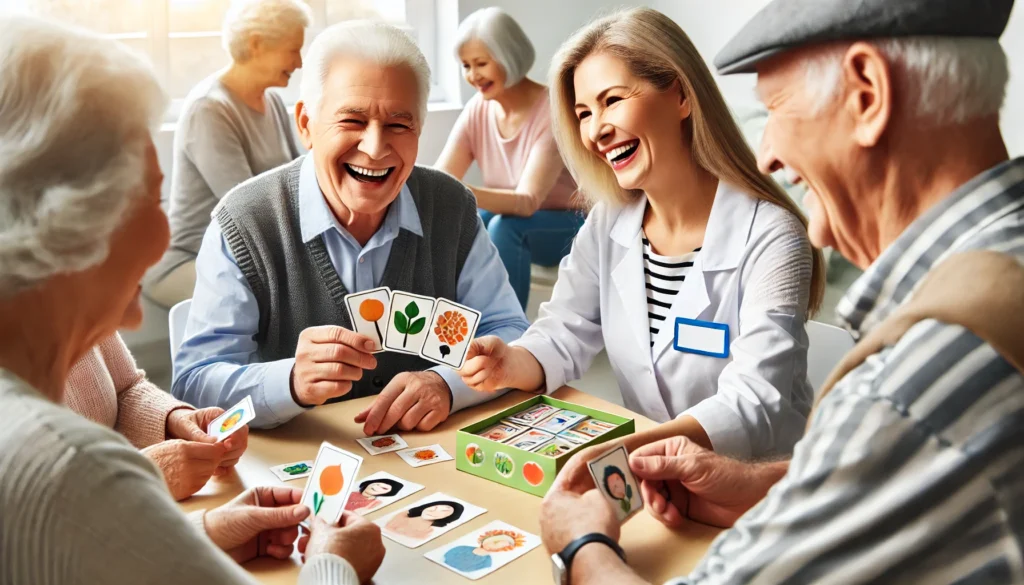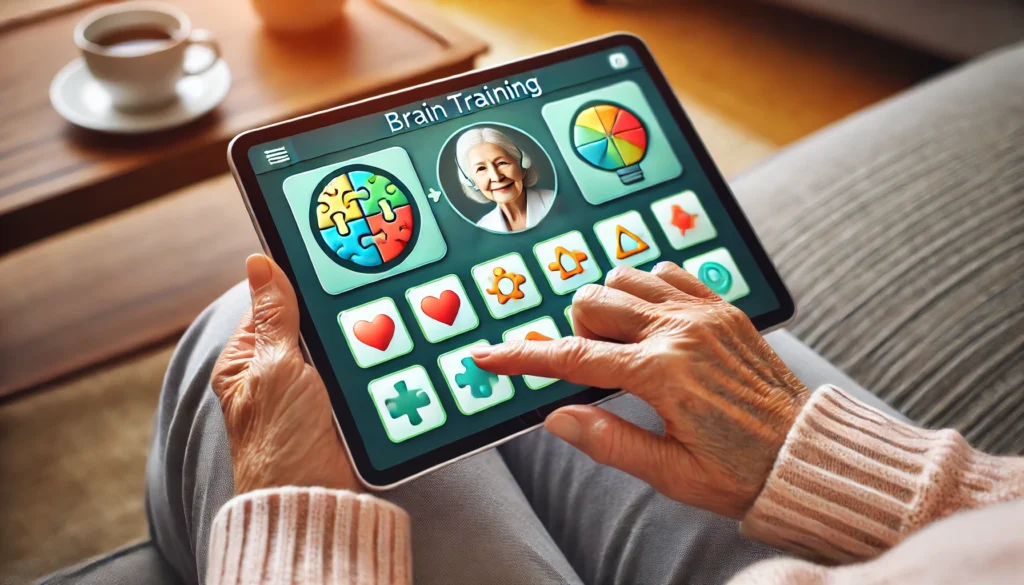As we age, maintaining cognitive health becomes increasingly important. For individuals with dementia, engaging in activities that stimulate the brain can be especially beneficial. In this article, we’ll explore how games and puzzles can be used to help boost cognitive skills in those living with dementia. We’ll delve into the scientific research supporting these activities and provide practical advice on how to implement them effectively.
You may also like: Boost Your Mind: Top Brain Games
The Science Behind Dementia Games and Puzzles
The question “Do puzzles help with dementia?” is frequently asked by those seeking to support loved ones with this condition. Scientific research suggests that engaging in puzzles and games can indeed have a positive impact. These activities stimulate various cognitive functions, including memory, problem-solving, and attention, which are often impaired in dementia.
The Role of Cognitive Stimulation in Dementia
Cognitive stimulation refers to activities that challenge the brain, encouraging it to develop new neural pathways. This concept is central to the approach of using games and puzzles to support cognitive health. Such activities not only engage the mind but also provide a structured way to exercise different cognitive domains, such as memory and reasoning.
Research has shown that cognitive stimulation can be as effective as certain medications in slowing the progression of dementia symptoms. By regularly involving individuals in stimulating activities, caregivers can help maintain their cognitive functions for a longer period.
Understanding Brain Plasticity
Brain plasticity, or neuroplasticity, is the brain’s ability to adapt and reorganize itself by forming new connections. Engaging in puzzles and games can promote brain plasticity, potentially slowing the progression of dementia symptoms. This adaptive capability of the brain is vital for learning new tasks and recovering lost skills.
Studies have demonstrated that even in later life, the brain retains some degree of plasticity. Engaging in complex tasks can stimulate the growth of neural networks, thereby enhancing cognitive resilience. This is particularly beneficial for individuals with dementia, as it can help mitigate the effects of cognitive decline.
Evidence from Scientific Studies
For example, a study published in the Journal of Geriatric Psychiatry and Neurology found that regular participation in cognitively stimulating activities was associated with a slower rate of cognitive decline in older adults. This highlights the potential of dementia games and puzzles to support cognitive health.
Furthermore, other studies have observed that individuals who frequently engage in mentally challenging activities tend to have better cognitive performance over time. This body of evidence underscores the importance of incorporating games and puzzles into the daily routines of those with dementia, offering a non-pharmacological approach to managing the condition.
Memory Games and Their Impact
Memory games are particularly effective in enhancing cognitive skills. These games often involve recalling patterns, sequences, or images, which can help improve short-term memory and attention span. Research has shown that practicing memory games can lead to measurable improvements in memory function in individuals with mild cognitive impairment.
Moreover, memory games can serve as a valuable tool for tracking cognitive changes over time. By observing how individuals respond to these games, caregivers can gain insights into the progression of the disease and adjust their strategies accordingly. Memory games also offer a way to engage individuals in a fun and meaningful activity, promoting a sense of achievement and well-being.

Types of Dementia Games and Puzzles
There are numerous types of games and puzzles that can be used to engage individuals with dementia. Each type offers unique benefits, allowing caregivers to tailor activities to the specific needs and preferences of their loved ones.
Jigsaw Puzzles: A Classic Choice
Jigsaw puzzles are a classic choice that can help improve visual-spatial skills and problem-solving abilities. The process of fitting pieces together requires concentration and patience, providing a sense of accomplishment upon completion. For those with dementia, choosing puzzles with larger pieces and simpler images can make the activity more accessible and enjoyable.
The tactile nature of jigsaw puzzles also provides sensory stimulation, which can be soothing and therapeutic for individuals with dementia. Completing a puzzle can boost confidence and self-esteem, reinforcing the individual’s sense of competence.
Word Games: Enhancing Language Skills
Word games, such as crosswords and word searches, can enhance language and memory skills. These games challenge players to recall vocabulary and recognize patterns, providing mental exercise that supports cognitive function. To accommodate varying skill levels, consider offering puzzles with larger print or fewer words.
In addition to cognitive benefits, word games can serve as a social activity, encouraging communication and interaction. They can be played individually or in groups, fostering a collaborative and supportive environment that promotes social engagement.
Strategy Games: Encouraging Critical Thinking
Strategy games, such as chess or checkers, require players to plan ahead and think critically. These games encourage logical reasoning and decision-making, skills that can be beneficial for individuals with dementia. Simplifying the rules or modifying the game to suit the individual’s abilities can make these activities more inclusive.
Playing strategy games can also provide a structured way to practice patience and perseverance. As players work through challenges and develop strategies, they can experience a sense of mastery and control, which can be empowering and fulfilling.
Digital Games and Apps: Modern Solutions
In today’s digital age, there are numerous apps and online games designed specifically for individuals with dementia. These digital platforms often offer a wide range of activities, from memory games to brain training exercises, allowing users to engage in cognitive stimulation at their own pace.
Digital games can be particularly appealing to tech-savvy individuals, offering a familiar and accessible medium for cognitive exercise. Many apps also provide feedback and progress tracking, enabling caregivers to monitor cognitive changes and tailor activities to individual needs.
Physical Activity and Movement Games
Incorporating physical activity into games can further enhance their benefits for individuals with dementia. Movement-based games, such as dance or exercise challenges, can improve coordination and balance while also providing cognitive stimulation. These activities can be adapted to suit different physical abilities, ensuring that everyone can participate.
Combining physical and cognitive exercises can lead to synergistic effects, promoting overall well-being and enhancing the quality of life for individuals with dementia. These activities also offer an opportunity for social interaction and fun, making them a valuable addition to any cognitive health plan.
Implementing Dementia Games and Puzzles in Daily Life
Integrating dementia games and puzzles into daily routines can provide consistent cognitive stimulation. Here are some practical strategies to ensure these activities are both enjoyable and beneficial:
Create a Routine: Establishing Consistency
Establishing a regular schedule for engaging in games and puzzles can help make these activities a habit. Setting aside specific times each day or week for cognitive stimulation ensures that individuals with dementia receive regular mental exercise.
Creating a routine also provides structure and predictability, which can be comforting for individuals with dementia. By incorporating games and puzzles into daily activities, caregivers can help maintain engagement and motivation, promoting a sense of purpose and fulfillment.
Encourage Social Interaction: Building Connections
Playing games with others can provide social interaction, which is also important for cognitive health. Group activities can foster a sense of community and support, reducing feelings of isolation often experienced by individuals with dementia.
Social engagement through games can also stimulate conversation and laughter, enhancing mood and emotional well-being. By involving family members, friends, or caregivers in these activities, individuals with dementia can strengthen their social connections and enjoy meaningful interactions.

Adapt Activities to Individual Abilities: Personalized Approaches
It’s important to choose games and puzzles that match the individual’s current cognitive abilities. As dementia progresses, modifying activities to ensure they remain accessible and enjoyable can help maintain engagement and motivation.
Personalizing games to suit individual preferences and strengths can make them more appealing and rewarding. By offering a variety of activities and levels of difficulty, caregivers can ensure that individuals with dementia feel challenged but not overwhelmed, promoting a positive and empowering experience.
Monitor Progress and Adjust: Tailoring Strategies
Regularly assessing the individual’s response to games and puzzles can help caregivers determine which activities are most effective. Adjusting the difficulty level or introducing new games can keep the experience fresh and challenging.
By tracking progress and observing changes in cognitive abilities, caregivers can make informed decisions about the types of activities that are most beneficial. This ongoing evaluation allows for a flexible and adaptive approach, ensuring that cognitive stimulation remains relevant and impactful.
Incorporate Variety and Fun: Keeping Engagement High
Introducing a variety of games and puzzles can prevent monotony and maintain interest. By rotating activities and incorporating new challenges, caregivers can keep individuals with dementia engaged and motivated.
Focusing on fun and enjoyment can also enhance the overall experience, making cognitive exercise a pleasurable and rewarding part of daily life. By fostering a positive and upbeat atmosphere, caregivers can create an environment that encourages exploration and creativity.

Conclusion
Engaging in dementia games and puzzles can play a significant role in supporting cognitive health for individuals with dementia. By providing mental stimulation, these activities can help slow cognitive decline and improve quality of life. With a variety of games available, caregivers can tailor activities to the needs and preferences of their loved ones, ensuring that cognitive stimulation remains both effective and enjoyable.
Through thoughtful implementation and adaptation, dementia games and puzzles can become a valuable part of a holistic approach to managing cognitive health. By understanding the science behind these activities and applying practical strategies, individuals with dementia can continue to engage their minds and enhance their well-being.
As caregivers and loved ones embrace the use of games and puzzles, they can empower individuals with dementia to live more fulfilling and enriched lives. By fostering a supportive and stimulating environment, we can all contribute to improving the cognitive health and overall well-being of those living with dementia.
Further Reading:
New Study Finds These Popular Games May Lower Your Risk of Dementia
Best Games For Alzheimer’s Patients: Engaging The Brain With Stimulating Activities
Best Brain and Memory Games for Dementia
Important Note: The information contained in this article is for general informational purposes only, and should not be construed as health or medical advice, nor is it intended to diagnose, prevent, treat, or cure any disease or health condition. Before embarking on any diet, fitness regimen, or program of nutritional supplementation, it is advisable to consult your healthcare professional in order to determine its safety and probable efficacy in terms of your individual state of health.
Regarding Nutritional Supplements Or Other Non-Prescription Health Products: If any nutritional supplements or other non-prescription health products are mentioned in the foregoing article, any claims or statements made about them have not been evaluated by the U.S. Food and Drug Administration, and such nutritional supplements or other health products are not intended to diagnose, treat, cure, or prevent any disease.


